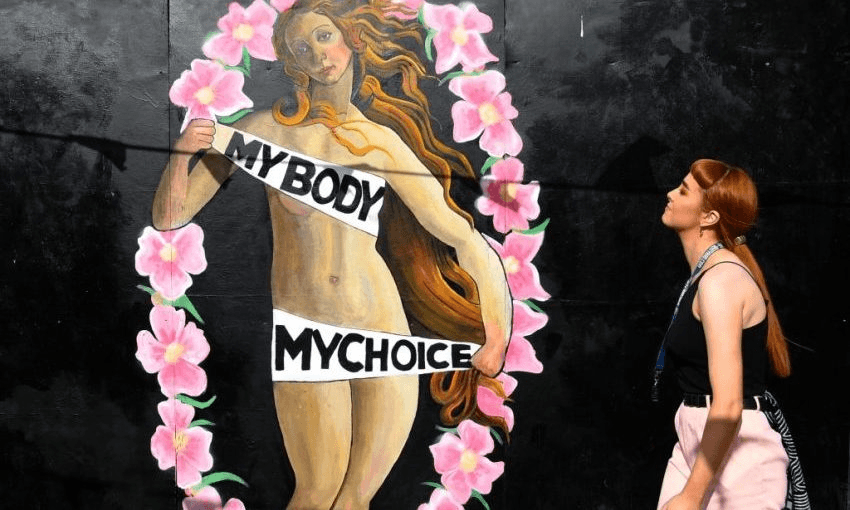In February 2018, justice minister Andrew Little wrote to the Law Commission asking for advice on abortion law reform that would ensure New Zealand’s laws are consistent with treating abortion as a health issue instead of a crime. Today the government announced its intention to remove abortion from the Crimes Act.
So what just happened?
In today’s announcement about the new Abortion Law Reform Bill, minister of justice Andrew Little stated: “Safe abortion should be treated and regulated as a health issue; a woman has the right to choose what happens to her body.”
The proposals before parliament followed on from the Law Commission’s report Alternative Approaches to Abortion Law, which gave three options on what a health approach to abortion could look like.
The three options before parliament were:
Model A – The decision whether to have an abortion would be made by the pregnant person concerned in consultation with their health practitioner. There would be no statutory test.
Model B – The health practitioner who intends to perform an abortion would need to be satisfied that the abortion is appropriate in the circumstances, having regard to the pregnant person’s physical and mental health and wellbeing.
Model C – There would be no statutory test until 22 weeks of a pregnancy. After 22 weeks, the health practitioner who intends to perform an abortion would need to be satisfied that the abortion is appropriate in the circumstances, having regard to the pregnant person’s physical and mental health and wellbeing.
The government have gone with Model C with a twist – more on that below.
The bill announced today will have its first reading on Thursday.
What does the law say at the moment?
Abortion is the only medical procedure included in the Crimes Act. Abortion is only legal for pregnancies under 20 weeks, unless the life of the mother is in danger. If your pregnancy is over 20 weeks and your life is not in danger, your best option is probably to travel to Australia, where in some states abortion is legal up to 24 weeks.
The current New Zealand law (enshrined in The Crimes Act 1961 and The Contraception, Sterilisation and Abortion Act 1977) states that a person who is under 20 weeks pregnant needs permission from two certifying doctors. They also need to undergo ultrasounds and blood tests, and some DHBs make counselling mandatory before the procedure can be performed.
Because doctors can only consent if there is serious danger to the person’s physical or mental health, 99% of all abortions in New Zealand are performed under the guise of ‘danger to mental health’. Rape, contraceptive failure or the inability to support a child are not, on their own, reason enough to approve an abortion.
Read more:
Dame Margaret Sparrow: 16 reasons to change the abortion law
Can everyone who wants an abortion get one now?
The short answer is no. The two consulting GPs needed to get approval for an abortion can refuse to do so as conscientious objectors. The only other part of medicine a doctor can conscientiously object to giving treatment or advice is in the area of contraception.
An estimated 200 women are refused access to an abortion every year in New Zealand. No data is held on why these terminations are denied.
What does the new bill say?
The bill announced today removes any statutory test for anyone less than 20 weeks pregnant, meaning a pregnant person can choose for themselves to have the procedure without ‘permission’ being granted by a doctor. They can self-refer to an abortion service provider. Qualified health practitioners who are not doctors can provide the service.
After 20 weeks, a health practitioner must reasonably believe the abortion is appropriate with regard to the pregnant person’s physical and mental health. Health practitioners will need to advise of the availability of counselling services but counselling will not be mandatory. These post-20 weeks regulations are more stringent than under ‘Model C’, which required the health practitioner performing the abortion to be satisfied that the abortion was appropriate in the circumstances after 22 weeks.
Did they get it right?
Dame Margaret Sparrow, a GP and long time advocate for women’s reproductive rights, and Jackie Edmond, chief executive of Family Planning, have both stated publicly their support for Model A, removing all statutory testing.
Many scans happen around the 20 week mark of a pregnancy, and the need for statutory testing after 20 weeks gives people only a small amount of time to consider their options.
Abortion rights advocacy group Abortion Law Reform Aotearoa NZ called today’s bill a “mixed bag”.
“It’s not as good as it could have been, but it’s so much better than the status quo, we have to give the government props for that,” said Terry Bellamak, the organisation’s president.
“It’s a good start.”

